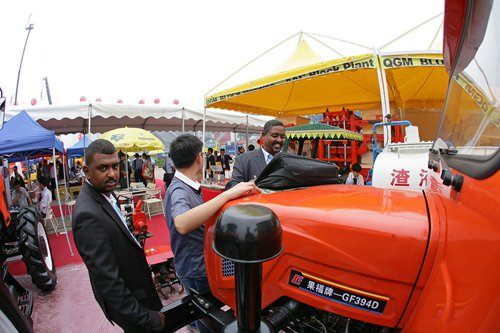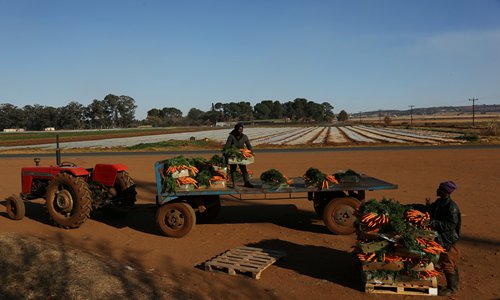
African buyers ask a Chinese exporter about product performance of a tractor at the Canton Fair in Guangzhou, South China's Guangdong Province on April 16, 2013. Photo: VCG

Farm workers offload carrots from a tractor at a farm in Eikenhof, near Johannesburg, South Africa on June 19, 2018. Photo: VCG
Li Tie, a Chinese businessman who has been trading Chinese manufactured agricultural machinery in Africa for almost 20 years, always sees his Indian counterparts as strong competitors in local market.
"Agricultural machinery, made in India, may account for about a 15 percent of market share in Zambia, while those from China are around 15 percent to 25 percent," Li, the chairman of Shanghai-based CAMCO Group, told the Global Times in an interview on Tuesday.
"While looking at the specific category of agricultural tractors, India's advantage is more obvious, with its share in Africa possibly doubles that of Chinese manufactured tractors," Li said.
Li's company is now cooperating with more than 30 farm equipment suppliers in China and selling their products to Africa, mainly to Zambia.
Liu Hanwu, chairman of Beijing-based Debont Corp, a supplier of agricultural equipment, also mentioned India's advantage over China in the African market. "Major Indian brands, particularly Mahindra & Mahindra, are quite popular among African farmers, and they have quite good quality and reliability," Liu said in an interview with the Global Times on Wednesday.
Mahindra & Mahindra, the biggest tractor player in India, currently holds a 43 percent market share of the Indian tractor industry. It also sets quite aggressive goals for its overseas businesses, aiming to draw half of its revenue from overseas operations in the next two to three years, according to a report from India newspaper business-standard.com.
The company set up a separate business unit to focus on the African market in 2015.
Vast opportunity
Africa has huge demands for agricultural machinery. According to data from the World Bank, farming accounts for 60 percent of total employment in Sub-Saharan Africa. Agriculture also plays a critical role in promoting poverty reduction, economic growth and environment sustainability across the continent.
"Take Zambia as an example, with more than 1,000 developed large scale commercial farms and more than 40,000 emerging farms, the market is quite attractive for equipment manufacturers from around the world," Li told the Global Times.
The good prospects have also prompted some companies to lift their forecasts for the market. As an example, US-based Deere & Co said it expected demand for its farm equipment in Africa to grow eight to 10 percent per annum in the coming years, according to a Reuters report in November 2018, citing Jacques Taylor, managing director of John Deere Sub-Saharan Africa.
"We see three or four countries with significant upside growth potential in the medium-term," he said, adding that the company also sees opportunities in countries like Angola, Zimbabwe, Ethiopia and Nigeria.
Escorts, India's third-largest tractor maker, is also aiming to quintuple exports over the next two years by focusing on Africa, saying that the (African) continent could be its second home market going forward, according to a Nikkei report in July, 2018.
While Li noted that China's opportunities are more lying in the emerging modern farms and smaller farmers. Owners of big commercial farms, who have stronger purchasing power, prefer to buy products from Europe and the US, which are global brand names of good quality, and using the latest technology.
"While for smaller farmers, since they don't have much brand loyalty and carry less weight with the manufacturers, the cost-effective products from India and China are their preferred choice, " Li noted. "By far, India performs better than China in terms of agricultural tractors."
India advantage
Li pointed out that one reason for its popularity is that though not as advanced as those from Europe and the US, Indian products enjoy an advantage of good technology, reliability and stability over Chinese products.
Liu said that "The technology gap between India-made and China-made tractors under 100 horsepower is not obvious, and the prices of the two are also quite similar."
Nevertheless, both Liu and Li cautioned that in a bid to catch up with Indian players, Chinese companies have to adjust their "mindset" when doing business in Africa.
"They [Chinese companies] have to 'build brands,' instead of just 'sell products' in the African market. For example, they need to set up a complete supply chain, including after-sale service stations near the local customers in order to win their trust and build a long-term relationship," Liu said.
Compared to its Chinese counterparts, Indian brands such as Mahindra & Mahindra and TAFE have already gained some traction in the industry, and are even targeting the high-end market, hoping to rival Western manufacturers.
"Not only Indian players, but even Turkish and Brazilian tractor makers have their own outlets there, " Liu said, adding that he also hoped that Chinese government could offer more support and streamline processes for companies who want to establish service stations overseas.
Liu further noted that another advantage Indian business people have in Africa, is that most of them tend to be proficient in English, and it's relatively easy for them to adapt to the local culture.
"In fact, for Chinese manufacturers and suppliers, language is a major barrier," according to Liu.
Li noted that India's early entry into the African market also enabled them to gain an early foothold in the continent. "In Africa, including Zambia, there are many Indo-African [or African-Indian] based there," Li stated, adding that many of them have already found local supply channels for their farm equipment.
China catch up
Experts said that China's agricultural machinery sector is "big, while not strong,"and most Chinese manufacturers only manufacture low-end equipment.
"To manufacture high-end products, we still need to import some critical parts from countries like Germany, or even import the entire item of equipment," Liu noted.
Some Chinese farmers still use second-hand agricultural machinery imported from Europe, the US and Japan. "We import all kinds of machinery, including automatic harvesters, felling machines and equipment to plant trees," Wan Bishu, an employee from Huan Hang Import Co based in South China's Guangdong Province, told the Global Times.
Wan said that the used equipment from Europe is usually gathered at ports in Germany and then transferred to China by sea. After customs clearance, the agricultural machinery is sent to buyers around China, including Northwest China's Xinjiang Uyghur Autonomous Region.
"The gap between European-produced agricultural machines and the ones made in China are just like the gap between cars of the two regions," Wan said.
The dependence in key technology, which could be seen in many domestic industries, cannot be solved overnight, so we should focus on improving the quality of Chinese products, and strengthen the research and development investment, in order to catch up, said Liu.
Experts told the Global Times that with China's increasing mechanization levels in its agricultural sector, the agricultural machinery sector is expected to develop at a much faster pace. Mechanization rate for crop cultivation and harvesting in China increased by 1 percent to more than 66 percent in 2017, according to a report from sohu.com.
Customs data also showed that the total trade volume of China's agricultural machinery industry reached $12.327 billion in 2017, a year-on-year increase of 11.18 percent. The export value was $100.89 billion, up 14.53 percent year-on-year.
Song Wei, Associate research fellow at Chinese Academy of International Trade and Economic Cooperation, told the Global Times that currently, China's help to Africa in the agricultural industry still centers around small farmers, for example, to teach them how to plant crops. If we could help countries build large-scale farms, Chinese machinery might be able to gain more recognition in Africa.
Shan Jie contributed to the story

